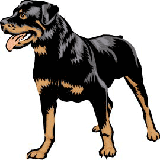Big DogsInformation About The Chinese Shar-pei Dog Breed |
|
|
History and origin: Formerly known as the Chinese fighting dog, the Chinese Shar-Pei is an ancient breed who was revered by the nobility during the Han dynasty, around 200 B.C. The Shar-Pei and the Chow Chow are the only two breeds with a blue-black tongue; this may point to common ancestry. The Shar-Pei has been used as a fighting dog, with loose skin that enables him to swing around and bite even while being bitten by another dog. He was also used to hunt wild boar and herd flocks. Description : The Shar-Pei stands 18 to 20 inches at the shoulder and weighs between 40 and 55 pounds. He has a medium-size muscular body, a fleshy face, a curled tail, and wrinkled skin on his face and body, though the wrinkles become less exaggerated as the dog matures. The shedding coat is short, harsh, and prickly to the touch and requires only periodic brushing. Coat length can vary from extremely short to just over an inch in length. The color may be black, chocolate, reddish brown, fawn, or cream. About the breed : The Chinese Shar-Pei is an intelligent dog who is loyal and affectionate toward his owner. On the other hand, he can also be an extremely dominant, controlling, moody breed that can be downright mean and dangerous. He will bond with only one or two persons and can be very suspicious of strangers. He is likely to bite if approached or petted by anyone he does not know and respect. He does not like being petted on the head even by his owner and is not for families with children unless he was raised with them from day one. The Shar-Pei is extremely territorial, dog-aggressive, and an excellent watch dog. There have been cases in which Shar-Peis have literally ripped another dog to shreds. This breed has a high prey drive toward small animals. Training must start early and should be firm and consistent. This breed can be disobedient and defiant and will bite even his owner if so inclined. Tantrums and uncontrollable behavior often occur during training, particularly when the owner attempts to teach him the "Down" command. Socializing the puppy is mandatory and is the cornerstone of successfully owning this breed. Never spoil this breed. Spoiling creates a bossy, nasty, suspicious dog capable of seriously hurting someone. The females are less aggressive than the males. The Shar-Pei can suffer from hip dysplasia, entropion, hypothyroidism, respiratory problems, and skin allergies. He drools, snorts, and may snore. This breed has become very popular over the last decade and has suffered from poor breeding. Breeders of the Chinese Shar-Pei should take a long, hard look at the type of dog they are producing, and endeavor to breed a dog with a more stable, more predictable, less combative temperament. Feeding : Recommended feeding for this breed is about 1 ½ cans (13.3oz) of high-quality meaty product per day with biscuit added in equal part or 3 cupfuls of complete, dry dog food. Ideal home : This breed is best suited in a house with a well-fenced secluded yard. The owner of a Chinese Shar-Pei should be a strong, commanding no-nonsense leader who desires a protective, highly discriminating, territorial dog that will be at best reserved with strangers. The home should be quiet and predictable. Children will not be tolerated and could get badly hurt, particularly if roughhousing occurs. The elderly and the disabled should not consider this breed. Time to train, socialize, and exercise this breed must be available.Back to the Big Dog Breed article page
| |
|
Related News About Dogs ' ); // get rid of newsfeed display by carp CarpConf('poweredby',''); CarpCacheShow('http://classifieds.agriscape.com/syndicate/dogs.rss'); ?>
|
|
|
|
|
|
Copyright © 2006-2007 dogguidance.com |


